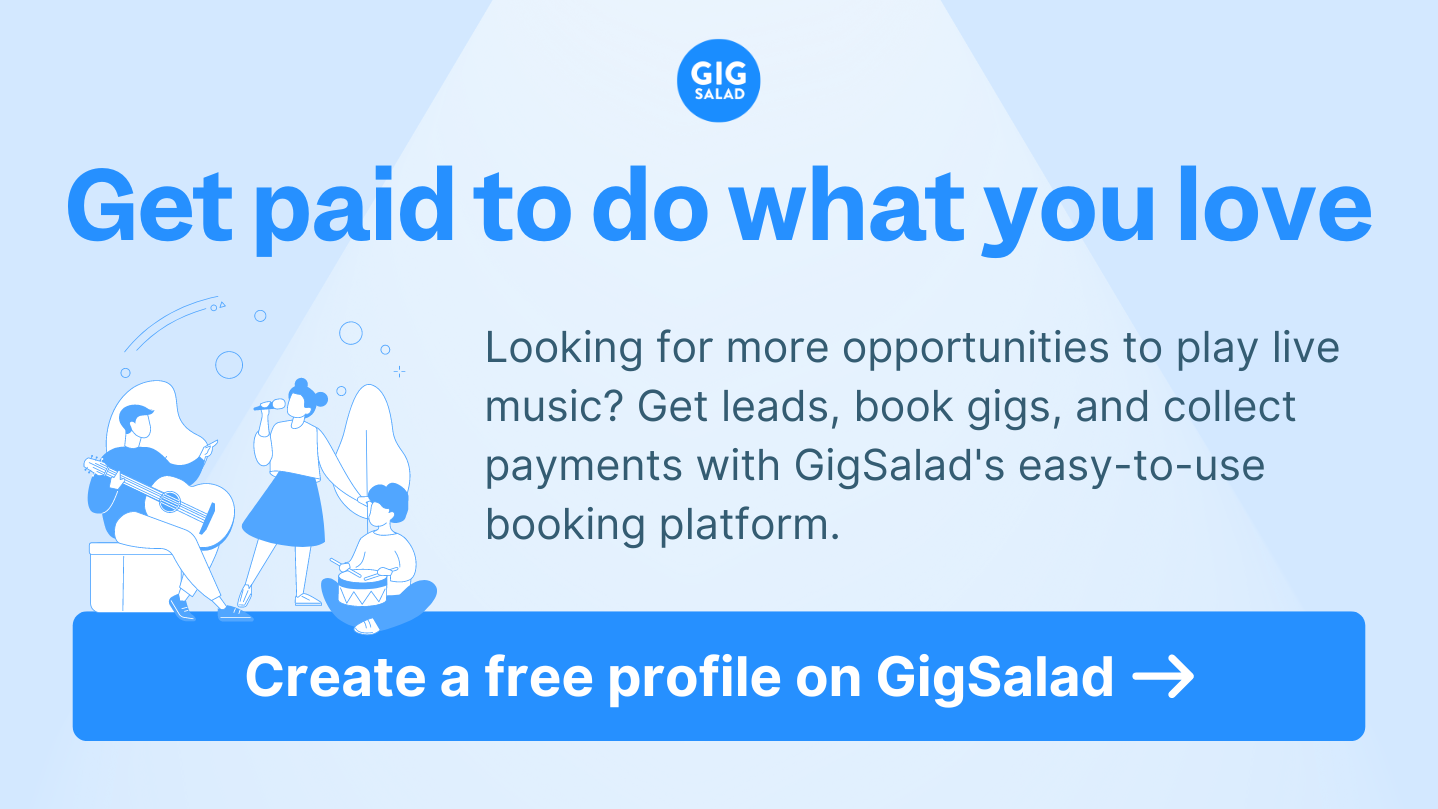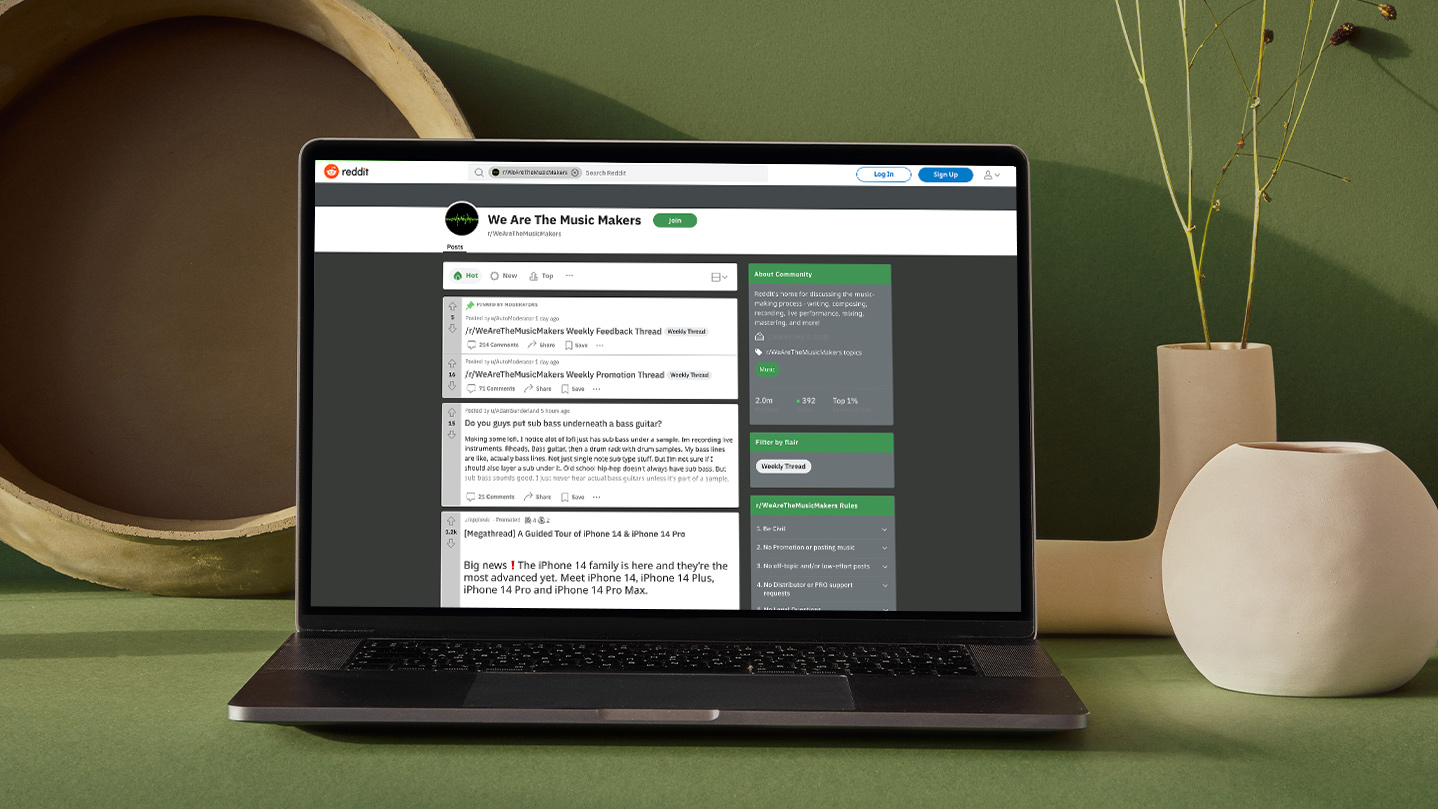This guest post was created by GigSalad.
Booking gigs can sometimes be challenging for musicians, but with the right strategies you can land more opportunities to showcase your talent. From getting experience to improving your marketing and business skills, we have expert advice guaranteed to help you book more gigs.
Gain experience
To line up gigs you must have an act worth booking. Gaining real experience in front of live audiences is the best way to hone your craft, finetune your setlist, and gain valuable feedback. Each of these following suggestions will help you see more success in the gigging business:
1. Play local shows
Gigging can be a grind, but it’s an important pursuit. Contact local businesses and venues offering live performances to see if they want to showcase any new acts.
- Music venues sometimes use local musicians as opening acts for touring groups.
- Restaurants and bars often have live music to draw patrons in.
- Hotels and casinos may feature musicians in their lobbies or at special events.
- Colleges and universities host campus events that might need musical acts.
2. Think outside the traditional venue
People tend to get stuck on concerts and traditional performances when thinking about booking music gigs. However, many opportunities exist with special events where you can share your talent and get paid.
- Weddings are a lucrative way to gain experience playing for different types of audiences.
- Corporate gigs like trade shows and company holiday parties often need musicians.
- Cruise ships usually feature live music, so why not get a gig and a trip away?
- Retirement communities love experiencing new acts and classics cover performers.
- High school student committees may want bands for their dances, proms, and graduation parties.
3. Expand your setlist
While the typical musician’s dream is to perform original music to a crowd of fans, it takes a while to reach that point. If you want to get that sing-along feeling early on, create a large repertoire of well-known cover songs you can choose from for each gig.
When building your setlist, get familiar with the gig to understand the event’s vibe and what kind of audience will be present. From there, develop a good mix of upbeat and mellow tracks, blending old and new songs. At the gig, stay flexible, adjust as needed based on the audience’s reactions, and take requests if the event allows.
4. Curate quality reviews
With experience comes the opportunity to receive feedback. As you book more gigs, create an intentional process for soliciting reviews. Potential clients are more likely to contact you if you have many positive reviews from past gigs.
Leaving reviews is a natural part of any purchase, so clients expect to be asked. You can bring it up before the gig and at the gig to let the client know you will be asking and look forward to their feedback. Then, follow up after the event with links to where you want the review sent (or posted directly online).
Market Yourself
How you market your music is entirely up to you, but you must have a strategy to be successful. Find ways to showcase your skills and build your exposure, whether it’s through social media, a website, or online marketplaces. We recommend using all these avenues, and especially using your own personalized music website!
5. Create promotional material
High-quality media to advertise your act is essential for successful marketing. Not every potential client will get to experience your music in person, so they need to be able to see the full picture of what you offer through whatever you put online.
Include a variety of photos, from staged promos to live-action shots from gigs. Avoid blurry or low-quality images. Videos are also extremely valuable to potential clients. Have someone film a song at a gig, record a private performance, make a music video, or put together a highlight reel with all of the above.
As a musician, having recorded music is another valuable asset. In addition to recording songs to put on Spotify and other streaming services, you should create some samples to post on your website or online profiles.
6. Develop a social media presence
Social media is a necessary outlet for getting gigs as a musician. It’s where fans often discover new music and maintain connections with the artists they like. Create and stick to a strategy because engagement and consistency are often the keys to many social algorithms.
Do your research to determine which platforms would work best for you, and give those your full attention. Though, you can still have a presence on others if you want. Set realistic goals and then watch the analytics to see how you’re doing.
TikToks and Reels are becoming the primary way people consume social media, so be sure to include visual media in your social media strategy. Play songs, host lives, or just talk to your fans about everyday life.
7. Build a website
Every business, including musicians, should make a professional music website. It serves as a marketing resource, a hub of information, and a way for clients to find you through search engines. You don’t even need to know how to code with so many easy-to-use website builders available, including Bandzoogle!
A great website should include a powerful homepage that serves as a one-page profile of sorts with high-quality imagery, client reviews, and a contact option. Then use other pages to offer a written biography about your background in music, provide more media, advertise upcoming gigs, and give people more ways to connect with you.
8. Use online booking platforms
Take advantage of the many tools available to you online for booking more gigs. Lead marketplaces like GigSalad can get you exposure to clients who might not find you otherwise. They also have full-service booking platforms for a seamless booking experience.
There are many perks to using a site like GigSalad.
- Online profiles help clients see your experience, look at media, read reviews, and compare you to competitors.
- Payment options allow clients to pay upfront, so your payouts are always fast and guaranteed — no chasing final balances.
- Reviews are requested through automated email follow-ups after the gig, saving you extra work for asking for feedback yourself.
- Tools like saved message and quote templates, lead preferences, and robust calendars will improve your workflow.
- Hands-on support is just a quick email or phone call away, whether you have questions about improving your profile, responding to leads, or dealing with bookings

Understand the Business
Until you have an agent or manager, it’s on you to manage the business side of things if you want to book more gigs. Learning how to price your services, communicate with clients, and build contracts is just as important as perfecting your performance.
9. Set your price
Charging the right amount is an integral part of building your gig business. You don’t want to undercharge, but you also don’t want to price yourself out of a good gig.
When determining your price, do your research to find out what other people are charging for the types of gigs you want. You should also identify your costs, including equipment, gas, insurance, and business expenses, to ensure you’re making a profit.
Find a baseline amount to charge within a set range. Consider offering multiple options and price points for variations of your services, like a solo gig vs. a band gig. Remain open to negotiations and work within a client’s budget when possible without selling yourself short.
10. Hone your communication skills
Communication is the key to any successful business, and that’s true for gigging as well. You need to be able to talk to your clients clearly and effectively if you want to turn a lead into a booked gig. Be sure to take cues from your clients to see how they prefer to communicate. You can try starting with a call, but follow their lead if they switch to text or online messaging.
Your first message to a potential client can make or break the deal. Keep it short and friendly. Tell them why you’d be a good fit for their event and ask a follow-up question to begin a dialogue. Always reply to new leads and messages as quickly as possible. Clients are more likely to move on to another option if they have to wait too long for a response.
11. Build effective contracts
Having clear and concise contracts in place for each booking is essential. It will help manage client expectations, protect you from potential issues, and ensure a smooth gigging experience.
There are a few important things every contract or booking agreement should have:
- Cover the basics like who, what, when, and where. This means the names of both parties, what you’re providing, when you’ll be there with specific times, and the exact address of the venue. Be sure contact information is present as well.
- Ask for a reasonable deposit to show a commitment from both parties and protect you from last-minute cancellations. However, avoid asking for too much, as this can scare a client away. 50% is a standard deposit amount.
- Describe your services clearly, detailing what you’ll do at the gig. Outline things like the size of your band, scheduled breaks, setlist or song requests you will accommodate, etc.
- Add a fair cancellation policy so you and the client know what would happen in the event of a cancellation. Offering a non-refundable deposit but a refundable final balance is a common and fair practice.
- Include additional terms if you have specific requirements for your gigs. This could be things like bad weather accommodations, equipment needs, or venue considerations.
12. Keep learning
One of the biggest mistakes you can make in business is to assume you know everything. Even after you’ve played a hundred gigs and developed a prominent online presence, there’s still more to learn and improve. Continued growth is the best way to keep getting more gigs.
Learn from your mistakes. Every lost gig or negative review is a chance to grow and know what you might have done wrong. Analyze your messages, your media, and your pricing to figure out what to change to make the next experience better.
You can also learn from your competitors. Look at their websites, online profiles, and social media presence to see how they market their act, price their services, and interact with clients. Borrow the things you like and learn what not to do from the things you don’t think are working.
With more experience, better marketing, and good business skills, you can elevate your music career and book more gigs. Remember, success in gigging requires not only talent but also strategic planning and continuous improvement. Embrace these strategies, and watch your gig opportunities grow!
GigSalad offers promotional tools and exposure to help performers get gigs. All kinds of event planners and talent buyers use GigSalad to book talent for corporate, private, and public gigs. Their members get booked for venues, weddings, corporate events, birthday parties, festivals, TV shows, commercials, movies, and more.



